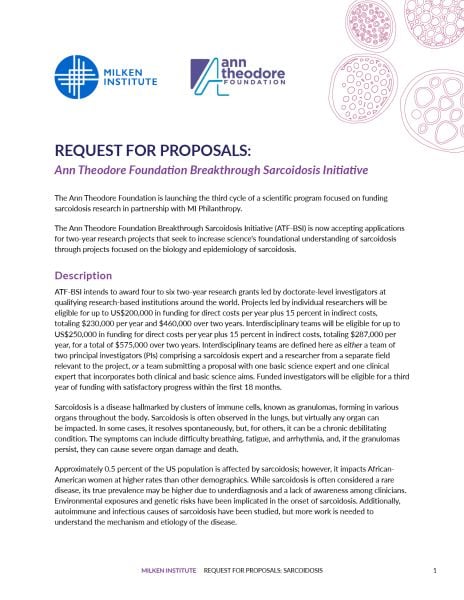
Request for Proposals: Ann Theodore Foundation Breakthrough Sarcoidosis Initiative
Third Round of Funding Available for Sarcoidosis Research
The Ann Theodore Foundation, in partnership with MI Philanthropy, launched The Ann Theodore Foundation Breakthrough Sarcoidosis Initiative (ATF-BSI) in 2021, a grant program focused on accelerating scientific understanding and treatment of sarcoidosis. To date, the program has awarded $5.8 million to sarcoidosis researchers.
The third cycle of funding has now been launched, with up to $3.4 million in total funding currently available to accelerate progress in the sarcoidosis field.
ATF-BSI is now accepting one-page Letters of Intent (LOI) through Wednesday, October 25, 2023. Individual researchers are eligible for up to $460,000 in funding over two years, and interdisciplinary teams will be eligible for up to $575,000 over two years. An informational session will be held on Wednesday, October 4, 2023, via Zoom. Please register for this event here. See Milken Institute’s press release or the Request for Proposals for more information.
About Sarcoidosis
Sarcoidosis is an inflammatory condition identified by clusters of immune cells called granulomas, usually found in the lungs but also throughout other organs in the body. For some with the condition, it resolves on its own without symptoms. For others, it can be a debilitating condition with the potential for organ damage and death. Symptoms include shortness of breath, fatigue, and arrhythmia. Sarcoidosis affects 2.3 million Americans, and African American women are at a higher risk than other demographics.
In partnership with The Ann Theodore Foundation, MI Philanthropy conducted an in-depth landscape of the sarcoidosis field, releasing a Giving Smarter Guide in 2021, identifying critical gaps in funding, research, and lack of clinical awareness. Currently, treatment options for individuals with sarcoidosis are limited and ineffective, resulting in significant side effects and poor quality of life for patients and their loved ones. Philanthropic support can drive transformational change and ignite much-needed hope for those affected.
